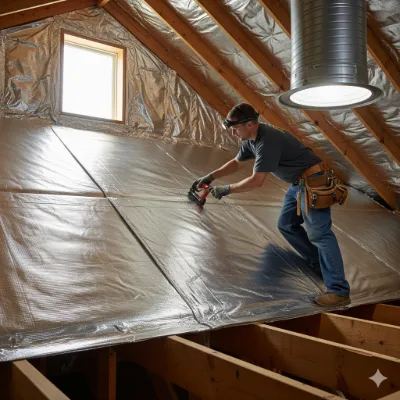
Radiant Barrier Insulation Cost in 2025: Prices, Benefits & Savings Guide
Introduction: Is Radiant Barrier Insulation Worth the Cost?
Energy costs are rising across the U.S., and homeowners are searching for smarter ways to keep their homes comfortable without breaking the bank. One solution gaining attention is radiant barrier insulation—a reflective insulation system designed to block radiant heat.
But the big question remains: What does radiant barrier insulation cost, and is it worth the investment?
In this guide, we’ll break down everything you need to know about pricing, installation, savings, and whether radiant barriers are the right choice for your home or project.
What is Radiant Barrier Insulation?
Radiant barrier insulation is a reflective material—usually aluminum foil laminated onto paper, film, or board—that reduces heat transfer by reflecting radiant heat.
Where it’s installed: Typically, in attics, under roof decks, or along rafters.
How it works: Unlike fiberglass or cellulose insulation that absorbs heat, radiant barriers reflect it away, keeping attics cooler.
Effectiveness: Reduces attic temperatures by up to 30°F in hot weather.
Radiant barriers work best in sunny, warm climates like Texas, Florida, and Arizona, where cooling costs are a major household expense.
Factors Affecting Radiant Barrier Insulation Cost
1. Attic Size
Larger attics require more material and labor, raising costs.
2. Type of Radiant Barrier
Single-sided foil – Affordable, entry-level
Double-sided foil – More effective, slightly higher cost
Spray-on coatings – Ideal for complex surfaces, mid-range price
3. Installation Method
Staple-up foil sheets: Faster and cheaper
Spray-on paint: Requires skilled labor, higher material cost
4. Labor Rates
Professional costs vary by region and contractor. A local contractor in Texas may charge less per sq. ft. compared to one in California.
5. Climate & Location
Homes in hotter regions see greater energy savings, making the investment more worthwhile.

Benefits That Offset the Cost
Investing in radiant barrier insulation isn’t just about upfront pricing—it’s about long-term returns:
Energy savings: Reduce cooling bills by 5%–15% annually
Comfort: Lower attic temps by up to 30°F
HVAC efficiency: Reduce strain on air conditioning units
Resale value: Energy-efficient homes attract buyers
Durability: Radiant barriers can last 20–30 years
DIY vs. Professional Installation
DIY Installation
Lower upfront cost
Great for accessible, walkable attics
Requires safety equipment (respirator, gloves, protective clothing)
Mistakes can reduce efficiency
Professional Installation
Expert application for maximum energy savings
Faster turnaround
Can handle complex attic layouts
Higher cost compared to DIY
For most homeowners, professional installation ensures optimal results and long-term energy savings.
Cost-Saving Tips for Radiant Barrier Installation
Get multiple quotes before choosing a contractor
Combine upgrades – Add radiant barrier while replacing a roof or improving insulation
Check rebates & incentives – Many states and utilities offer energy-efficiency credits
DIY where possible – Consider hybrid installations (pro + DIY prep work)
Common Myths About Radiant Barriers
“They replace insulation” → Radiant barriers work with, not instead of, traditional insulation.
“They only help in summer” → They also reduce winter heat loss.
“They’re too expensive to be worth it” → In warm climates, ROI is often within a few years.
FAQs About Radiant Barrier Insulation
Q1: Does radiant barrier insulation really save money?
Yes—homes in hot climates see cooling cost reductions of 5%–15% annually.
Q2: How long does it last?
Radiant barriers typically last 20–30 years with minimal upkeep.
Q3: Can it be installed in existing homes?
Yes—staple-up foil or spray-on coatings make it easy to retrofit existing attics.
Q4: Is it worth the cost in colder climates?
It provides less benefit in northern states but still improves overall efficiency when combined with other insulation.
Conclusion: Is Radiant Barrier Insulation Worth the Cost?
Radiant barrier insulation may require an initial investment, but the payoff is long-lasting energy savings, improved comfort, and increased home value. For homeowners in hot climates, the benefits far outweigh the cost.
At Best Construction Products (BCP Inc.), we help contractors and homeowners choose the best insulation solutions for their projects. Our team can guide you through product selection and installation options to ensure you get maximum value for your investment.
Ready to cut your energy bills? Contact BCP Inc. today for expert guidance and premium construction products.